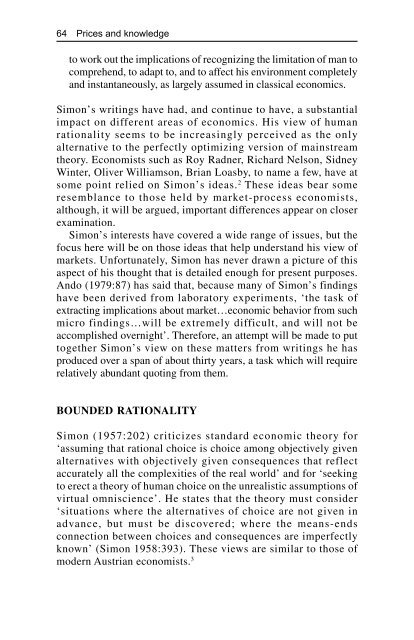Prices and knowledge: A market-process perspective
Prices and knowledge: A market-process perspective
Prices and knowledge: A market-process perspective
You also want an ePaper? Increase the reach of your titles
YUMPU automatically turns print PDFs into web optimized ePapers that Google loves.
64 <strong>Prices</strong> <strong>and</strong> <strong>knowledge</strong>to work out the implications of recognizing the limitation of man tocomprehend, to adapt to, <strong>and</strong> to affect his environment completely<strong>and</strong> instantaneously, as largely assumed in classical economics.Simon’s writings have had, <strong>and</strong> continue to have, a substantialimpact on different areas of economics. His view of humanrationality seems to be increasingly perceived as the onlyalternative to the perfectly optimizing version of mainstreamtheory. Economists such as Roy Radner, Richard Nelson, SidneyWinter, Oliver Williamson, Brian Loasby, to name a few, have atsome point relied on Simon’s ideas. 2 These ideas bear someresemblance to those held by <strong>market</strong>-<strong>process</strong> economists,although, it will be argued, important differences appear on closerexamination.Simon’s interests have covered a wide range of issues, but thefocus here will be on those ideas that help underst<strong>and</strong> his view of<strong>market</strong>s. Unfortunately, Simon has never drawn a picture of thisaspect of his thought that is detailed enough for present purposes.Ando (1979:87) has said that, because many of Simon’s findingshave been derived from laboratory experiments, ‘the task ofextracting implications about <strong>market</strong>…economic behavior from suchmicro findings…will be extremely difficult, <strong>and</strong> will not beaccomplished overnight’. Therefore, an attempt will be made to puttogether Simon’s view on these matters from writings he hasproduced over a span of about thirty years, a task which will requirerelatively abundant quoting from them.BOUNDED RATIONALITYSimon (1957:202) criticizes st<strong>and</strong>ard economic theory for‘assuming that rational choice is choice among objectively givenalternatives with objectively given consequences that reflectaccurately all the complexities of the real world’ <strong>and</strong> for ‘seekingto erect a theory of human choice on the unrealistic assumptions ofvirtual omniscience’. He states that the theory must consider‘situations where the alternatives of choice are not given inadvance, but must be discovered; where the means-endsconnection between choices <strong>and</strong> consequences are imperfectlyknown’ (Simon 1958:393). These views are similar to those ofmodern Austrian economists. 3
















